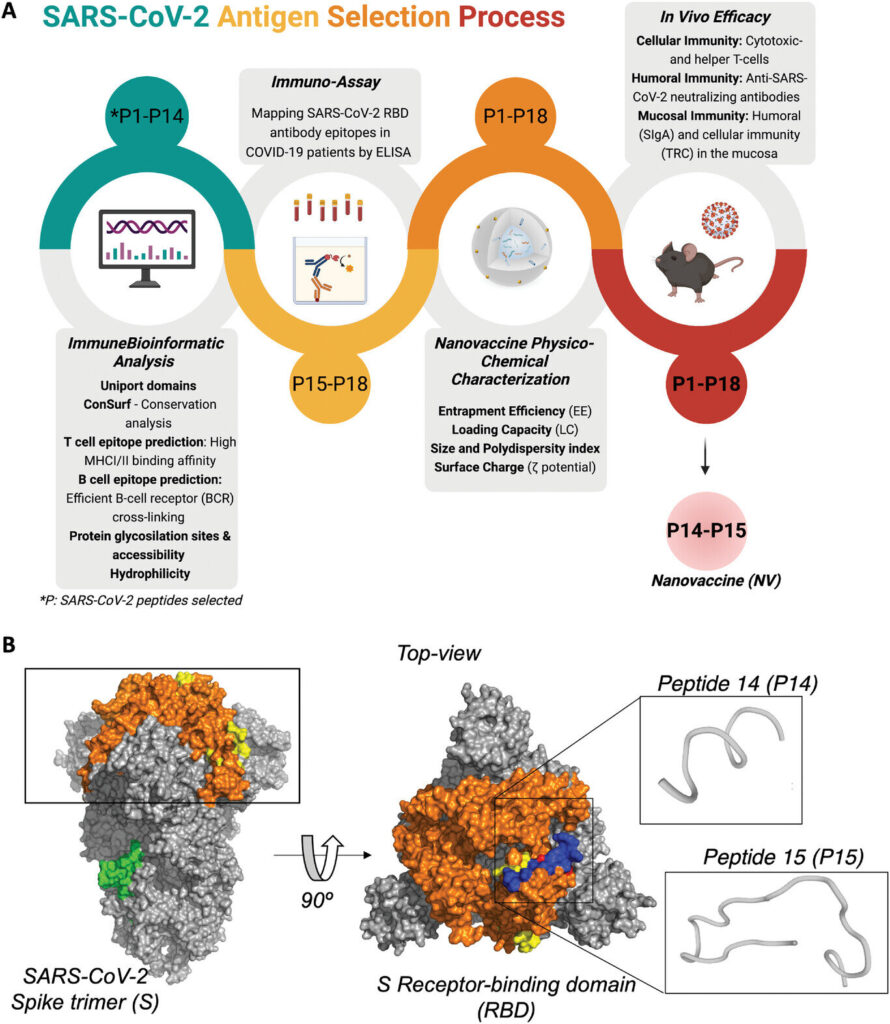Researchers at Tel Aviv University have developed an effective, inexpensive, and simple COVID-19 vaccine that can be stored at room temperature and administered as a nasal spray
Prof. Ronit Satchi-Fainaro’s lab at TAU’s Faculty of Medical and Health Sciences collaborated with Professor Helena Florindo’s lab at the University of Lisbon to produce a novel nano-vaccine for COVID-19. The nano-vaccine, a 200-nanometer particle, trains the immune system against all common COVID-19 variants, just as effectively as existing vaccines.
Moreover, unlike other vaccines, it is conveniently administered as a nasal spray and does not require a cold supply chain or ultra-cold storage. These unique features pave the way to vaccinating third-world populations, as well as the development of simpler, more effective, and less expensive vaccines in the future. The revolutionary study was featured on the cover of the journal Advanced Science.
Prof. Satchi-Fainaro explains, “The new nano-vaccine’s development was inspired by a decade of research on cancer vaccines. When the COVID-19 pandemic began, we set a new goal: training our cancer platform to identify and target the coronavirus. Unlike Moderna and Pfizer, we did not rely on full protein expression via mRNA.
“Instead, using our computational bioinformatics tools, we identified two short and simple amino acid sequences in the virus’s protein, then synthesized them, and encapsulated them in nanoparticles.”
Eventually, this nano-vaccine proved effective against all major variants of COVID-19, including beta, delta, omicron, etc.
“Our nano-vaccine offers a significant advantage over existing vaccines because it is needle-free and administered as a nasal spray,” notes Prof. Satchi-Fainaro.
“This eliminates the need for skilled personnel such as nurses and technicians to administer injections, while also reducing risks of contamination and sharp waste. Anyone can use a nasal spray, with no prior training.”
Another major advantage of the revolutionary nano-vaccine is its minimal storage requirements. Moderna’s sensitive mRNA-based vaccine must be kept at -20°C and Pfizer’s at -70°C, generating great logistic and technological challenges, such as shipping in special aircraft and ultra-cold storage—from the factory to the vaccination station.
Prof. Satchi-Fainaro’s novel synthetic nanoparticles are far more durable and can be stored as a powder at room temperature. “There’s no need for freezing or special handling,” she says.
“You just mix the powder with saline to create the spray. For testing purposes (as part of the EU’s ISIDORe (Integrated Services for Infectious Disease Outbreak Research) feasibility program) we shipped the powder at room temperature to the INSERM infectious diseases lab in France. Their tests showed that our nano-vaccine is at least as effective as Pfizer’s vaccine.”
These important advantages—ease of nasal administration and regular storage and shipping—pave the way towards vaccinating at-risk populations in low-income countries and remote regions, which existing vaccines are unable to reach. Moreover, the novel platform opens the door for quickly synthesizing even more effective and affordable vaccines for future pandemics.
“This is a plug-and-play technology,” explains Prof. Satchi-Fainaro. “It can train the immune system to fight cancer or infectious diseases like COVID-19. We are currently expanding its use to target a range of additional diseases, enabling the rapid development of relevant new vaccines when needed.”
Provided by
Tel-Aviv University


